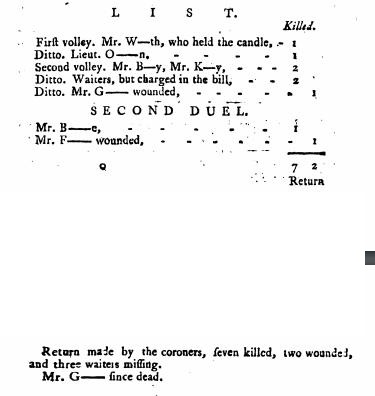One Duel Eight Dead January 27, 2018
Author: Beach Combing | in : Modern , trackbackA duel was described in a British compendium in 1784: the Weekly Entertainer since you ask. The full text is below for connoisseurs, but what was remarkable about it was that eight men died and 2 were injured.
Briefly the story went as follows. A group of friends in a tavern in Galway had an argument. At the risk of being algebraic there were five: a Mr B, a Mr. K, a Lieut. O, a Mr R, and a Mr W. Mr R and Lieut O demanded their pistols to fight each other. However, while discussing the distance for a pistol shot Lieut O argued with a Mr. B and demanded honour from him as well. A fourth friend Mr W who was rather drunk set the rules as follows. They would fight in the tavern. Each man should be blindfolded, be given a case of pistols and be allowed to shoot where he would. Mr W. and Lieut O. were both killed on the first volley. Two waiters were shot coming through the door to see what was happening and Mr R. and Mr. K also died in the second volley: Mr. B. lost his chin but survived. Two friends of this group subsequently argued about the duel and killed each other in their own contest of honour with swords.
Did it actually happen?
First consideration, Ireland was the dueling capital of Europe, and Galway was arguably the dueling capital of Ireland. Young Irish gentlemen in the eighteenth century were ‘familiarised’, in a wonderful sentence, ‘with duelling from boyhood, and brought up to consider it as an every day occurrence, to which gentlemen as a tax upon lineage and position, were bound to yield.’ There is the suspicion that a sketch writer chose the most likely place in what was then the United Kingdom for an invented but amusing anecdote.
Second consideration. The story is messy, but messy in an unrealistic way. There is a Mr K. who only appears to die. A Mr G suddenly turns up in the story: presumably an error for Mr B. Perhaps the editor accidentally missed out this man’s role. But it is more likely that the original sketch writer just got confused with his own conceit. The table at the head of the post is wrong on two points. It says, for example, that seven died. Beach also can’t make the bullets add up.
Third consideration. At least one of the two duels went before a magistrate and yet there is no record of either in the press of the day. Duels were often and for very understandable reasons hushed up, but a duel in which five men died (two of them bystanders) would not and could not be overlooked by the law.
Fourth consideration. Wonderful and bizarre things happen in life, but not this wonderful and bizarre. (Might regret writing this).
Great story but almost certainly an eighteenth century fiction: contrary opinions or better evidence drbeachcombing At gmail DOT com
Five gentlemen, intimate friends, having dined at a tavern in Galway, unfortunately after dinner some words arose between Mr. R___y and Lieut O___n, which nothing would appease but immediate fighting. Two gentlemen of the party were appointed seconds, but not agreeing about the distance, Mr. B___ and Lieutenant O___ should fight, quarreled likewise. Mr W___th, the remaining peaceable person, was referred to, to determine the distance &c.; and he being rather in liquor, said that he knew no place so fit to settle the affair as the room they were in; and as they could not agree about the distance, advised each to have a case of pistols and to tie handkerchiefs round their eyes, so as to fire indiscriminately; Mr. W___ proposing to hold the candle for them. This proposal met with the approbation of all parties; viz G___ [who is g?], Lieutenant O___, Mr. R___, and Mr. Kelly; everything being amicably adjusted, and the handkerchiefs tied round their eyes, they began to fire. The first volley killed Mr. W—th, who held the candle, and lieutenant O___n. The report of the pistols brought up the waiters, who entering the door just as the remaining gentlemen fired, were killed on the spot, though the balls had previously taken effect on the breast and heart of Mr. R___ and Mr. K___, Mr. G___ [corr B?] being the only one that escaped death, though with the loss of his chin. The consternation the above melancholy affair caused, is not to be described; nor did it prevent another melancholy affair that happened in consequence. Two gentlemen, as intimate friends as the above-mentioned, talking of the event, quarrelled because they differed in opinion about the conduct of Mr. W___th, who held the candle: they fought immediately with swords. Both were run through the heart. The inquest sat, and brought in their verdict manslaughter, every one being dead. The above affair happened on the 29th of September. As it was a complicated scene of business, I shall add a list of the killed and wounded. [see head of post]



